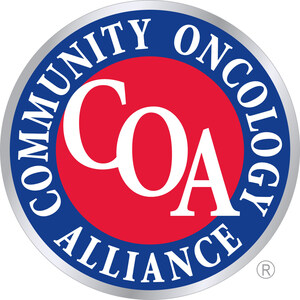Congressional Bill Introduced To Fix Problem With Faulty Medicare Payment For Cancer Drugs
Strong Bi-partisan Support for H.R. 800 to Stem Cancer Care Crisis; Community Oncology Alliance Announces Support
WASHINGTON, Feb. 27, 2013 /PRNewswire/ -- The Community Oncology Alliance (COA) announced its support today of H.R. 800 to exclude manufacturer-to-distributor prompt pay discounts from Medicare's payment for cancer drugs. H.R. 800 would fix a flaw in Medicare that artificially reduces cancer drug reimbursement, which has led to access problems and increased costs to cancer patients. The bill, commonly known as the Prompt Pay Bill, is sponsored by Representative Ed Whitfield (R-KY) and was introduced with strong bi-partisan support from 31 House co-sponsors from 21 states.
Prompt pay discounts are contractual terms provided by pharmaceutical manufacturers to drug distributors. These discounts are not typically passed on to community cancer clinics that directly administer IV chemotherapy and related cancer drugs to their patients. The problem is not with the discounts but that they are included in the calculation of ASP, the basis for Medicare cancer drug reimbursement. Inclusion inappropriately depresses payments to cancer clinics, which adversely impacts cancer care and increases costs to Medicare and seniors. H.R. 800 instructs manufacturers to exclude prompt pay discounts from their calculations of ASP provided to Medicare.
"Addressing the prompt pay issue is about addressing issues of patient access to care and preserving the best cancer care delivery system in the world," said Representative Ed Whitfield. "Community cancer clinics are under pressure like never before and without their ability to provide care and ensure patient access to care, advances in treatment mean little and we are less equipped to win the war on cancer."
"The cancer community is grateful for the leadership of Congressman Whitfield and the 31 co-sponsors who recognize the urgent need to fix an obvious flaw in Medicare that impacts patient care," said Dr. Mark Thompson, COA president and an oncologist at the Zangmeister Center, Columbus, Ohio. "H.R. 800 will help stem the crisis that is plaguing cancer care."
Congress has already fixed a similar flaw with Medicaid by removing the inclusion of prompt pay discounts. The inclusion of the prompt pay discounts in Medicare cause many cancer drugs to be reimbursed at less than their acquisition. The House Energy & Commerce Committee actually included the fix contained in H.R. 800 in their version of health care reform several years ago. COA believes it is now time to pass H.R. 800 into law and help preserve the nation's cancer care delivery system.
About Community Oncology Alliance (COA)
Celebrating its 10th anniversary during 2013, the Community Oncology Alliance (COA) is a non-profit organization dedicated solely to community cancer care, where four out of five Americans with cancer are treated. Since its formation, COA has helped community cancer clinics navigate an increasingly hostile environment by working together to become more efficient, advocating for their patients, and proactively providing solutions to the Congress and policy makers. COA members have testified before both chambers of Congress, authored cancer care demonstration projects, been instrumental in the passage of oral cancer drug parity legislation, among many other initiatives. COA is leading a multi-stakeholder group that is developing and implementing an Oncology Medical Home cancer care model and is advancing payment reform for cancer care. More information can be found at www.CommunityOncology.org.
The COA Patient Advocacy Network (CPAN) was created in 2010 to advocate for access to local affordable care for all cancer patients. More information can be found at www.COAadvocacy.org.
SOURCE Community Oncology Alliance
WANT YOUR COMPANY'S NEWS FEATURED ON PRNEWSWIRE.COM?
Newsrooms &
Influencers
Digital Media
Outlets
Journalists
Opted In





Share this article